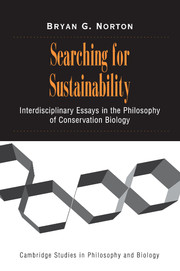Book contents
- Frontmatter
- Contents
- Searching for Sustainability
- General Introduction: An Interdisciplinary Experiment
- I PRAGMATISM AS AN ENVIRONMENTAL PHILOSOPHY
- 1 The Constancy of Leopold's Land Ethic
- 2 Thoreau and Leopold on Science and Values
- 3 Integration or Reduction: Two Approaches to Environmental Values
- 4 Convergence Corroborated: A Comment on Arne Naess on Wolf Policies
- 5 Pragmatism, Adaptive Management, and Sustainability
- II SCIENCE, POLICY, AND POLICY SCIENCE
- III ECONOMICS AND ENVIRONMENTAL SUSTAINABILITY
- IV SCALING SUSTAINABILITY: ECOLOGY AS IF HUMANS MATTERED
- V SOME ELEMENTS OF A PHILOSOPHY OF SUSTAINABLE LIVING
- VI VALUING SUSTAINABILITY: TOWARD A MORE COMPREHENSIVE APPROACH TO ENVIRONMENTAL EVALUATION
- Index
- References
1 - The Constancy of Leopold's Land Ethic
Published online by Cambridge University Press: 21 January 2010
- Frontmatter
- Contents
- Searching for Sustainability
- General Introduction: An Interdisciplinary Experiment
- I PRAGMATISM AS AN ENVIRONMENTAL PHILOSOPHY
- 1 The Constancy of Leopold's Land Ethic
- 2 Thoreau and Leopold on Science and Values
- 3 Integration or Reduction: Two Approaches to Environmental Values
- 4 Convergence Corroborated: A Comment on Arne Naess on Wolf Policies
- 5 Pragmatism, Adaptive Management, and Sustainability
- II SCIENCE, POLICY, AND POLICY SCIENCE
- III ECONOMICS AND ENVIRONMENTAL SUSTAINABILITY
- IV SCALING SUSTAINABILITY: ECOLOGY AS IF HUMANS MATTERED
- V SOME ELEMENTS OF A PHILOSOPHY OF SUSTAINABLE LIVING
- VI VALUING SUSTAINABILITY: TOWARD A MORE COMPREHENSIVE APPROACH TO ENVIRONMENTAL EVALUATION
- Index
- References
Summary
In 1920 Aldo Leopold enthusiastically described his predator eradication program. He had formed a coalition of sportsmen and stockmen to eliminate wolves, mountain lions, and other large predators from Arizona and New Mexico: “But the last one must be caught before the job can be called fully successful,” he said (Flader 1974: 3). Twenty-four years later Leopold repented his war on wolves in a graceful and humble essay, “Thinking Like a Mountain,” which was drafted in 1944 and published in A Sand County Almanac and Sketches Here and There. What happened in the meantime?
It is tempting to believe that, during this period, Leopold discovered his revolutionary land ethic, that his thinking underwent a profound religious-metaphysical-moral change, and that his about-face on predator control programs was a direct result of this profound philosophical conversion. Since Leopold was acting, in 1920, as a representative of the U.S. Forest Service, which remained under the philosophical domination of Gifford Pinchot's humanistic utilitarianism, this interpretation sees Leopold as later rejecting utilitarian management because he came to espouse “a right to exist” for all members of the land community (see, for example, Petulla 1980: 16, 20).
This essay seeks to show that Leopold's intellectual odyssey during this period was more complex than this straightforward account would suggest. In particular, Leopold had embraced the main philosophical elements of his land ethic early in his career, even while he was advocating predator eradication.
- Type
- Chapter
- Information
- Searching for SustainabilityInterdisciplinary Essays in the Philosophy of Conservation Biology, pp. 13 - 29Publisher: Cambridge University PressPrint publication year: 2002
References
- 1
- Cited by

